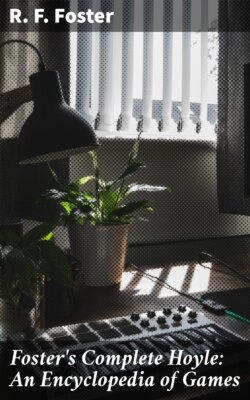Читать книгу Foster's Complete Hoyle: An Encyclopedia of Games - R. F. Foster - Страница 3
На сайте Литреса книга снята с продажи.
INTRODUCTION.
ОглавлениеTable of Contents
The word “Hoyle” has gradually come to stand as an abbreviation for an “Encyclopedia of Indoor Games.” The common expression, “played according to Hoyle,” usually means “correctly played,” or “played according to the standard authorities.” The original Edmund Hoyle wrote on very few games, but his work was the first attempt to put together the rules for the most popular indoor games in one volume. Although Hoyle died more than a hundred years ago, his work has been constantly added to as new games came into vogue, which has led many to believe that he is the authority for games that he never heard of, such as pinochle and poker.
Persons who have never given the subject much attention may be surprised to learn how little authority there is for the rules governing the majority of our popular games. If we except the table games, such as chess, checkers, billiards, backgammon and ten pins, and such card games as whist, bridge, auction, and skat, all of which are regulated by well-defined codes of laws, agreed upon by associations of prominent clubs, to govern championship contests, etc., we have very few games left which are not played in different ways in various localities.
This is undoubtedly because such games are learnt at the card table and not from books. A person who is shown a new game cannot remember all its details, some of which may not have been explained to him even. If he tries to teach it to others while his knowledge is in this imperfect state, he will naturally invent rules of his own to cover the points he has forgotten, or has never learnt, usually borrowing ideas from games with which he is more familiar.
The pupils of such a teacher pass on to others the game thus imperfectly learnt, and in a short time we have a number of corruptions creeping in, and the astonishing part of it is the insistence with which some persons will maintain that they alone have the right idea of the rules, just because so-and-so showed them the game, or because they and their immediate friends have “always played it that way.”
This does not alter the fact that the fundamental principles of every game are known and can be readily found if one knows where to look for them. The author is in possession of several hundred works in various languages—English, French, German and Italian—on nothing but indoor games, comprising probably everything ever printed on the subject that is worth preserving.
By tracing the history of a game and its development through the various books in which it is described, the game will always be found to belong to some distinct family, which has certain well-defined traits which must be preserved, no matter how much they may be altered in minor details. All games follow certain general principles, and the surest mark of error in the local rules of any game is inconsistency.
Pinochle is a striking example of this. In many places the players will not allow the same cards to be counted twice in the trump sequence, so as to meld 190; but they will count them twice in four kings and queens. They insist on the rule of at least one fresh card from the hand for each additional meld in one case, but totally disregard it in another, as when they meld 240 for the round trip, instead of only 220.
These local errors have crept into many of the Hoyles now upon the market, the works having probably been compiled from the individual knowledge of the author, limited by his experience in a certain locality. Many of these works devote much space to a certain game, which is evidently the compiler’s pet, and which is accurately described; while other and equally important games are full of errors and omissions, betraying a lamentable want of care in consulting the literature of the subject.
While the author of this work does not believe it possible to compile a work that shall be universally accepted as the authority on all games, as a dictionary would be on spelling, he deems it at least possible to select what seems the most common usage, or the best rule, preserving the true spirit of the game, and to describe it accurately and bring the whole up to date.
